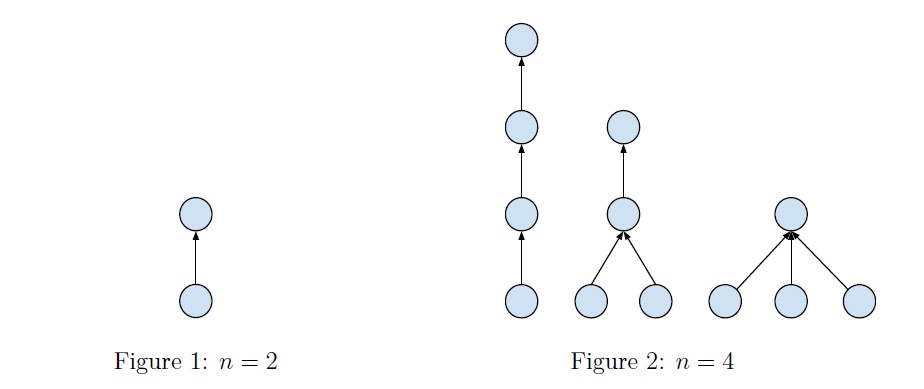HDU 4472 Count(数学题)
Count
Description
Prof. Tigris is the head of an archaeological team who is currently in charge of an excavation in a site of ancient relics.
This site contains relics of a village where civilization once flourished. One night, examining a writing record, you find some text meaningful to you. It reads as follows.
“Our village is of glory and harmony. Our relationships are constructed in such a way that everyone except the village headman has exactly one direct boss and nobody will be the boss of himself, the boss of boss of himself, etc. Everyone expect the headman is considered as his boss’s subordinate. We call it relationship configuration. The village headman is at level 0, his subordinates are at level 1, and his subordinates’ subordinates are at level 2, etc. Our relationship configuration is harmonious because all people at same level have the same number of subordinates. Therefore our relationship is …”
The record ends here. Prof. Tigris now wonder how many different harmonious relationship configurations can exist. He only cares about the holistic shape of configuration, so two configurations are considered identical if and only if there’s a bijection of n people that transforms one configuration into another one.
Please see the illustrations below for explanation when n = 2 and n = 4.

The result might be very large, so you should take module operation with modules 109 +7 before print your answer.
This site contains relics of a village where civilization once flourished. One night, examining a writing record, you find some text meaningful to you. It reads as follows.
“Our village is of glory and harmony. Our relationships are constructed in such a way that everyone except the village headman has exactly one direct boss and nobody will be the boss of himself, the boss of boss of himself, etc. Everyone expect the headman is considered as his boss’s subordinate. We call it relationship configuration. The village headman is at level 0, his subordinates are at level 1, and his subordinates’ subordinates are at level 2, etc. Our relationship configuration is harmonious because all people at same level have the same number of subordinates. Therefore our relationship is …”
The record ends here. Prof. Tigris now wonder how many different harmonious relationship configurations can exist. He only cares about the holistic shape of configuration, so two configurations are considered identical if and only if there’s a bijection of n people that transforms one configuration into another one.
Please see the illustrations below for explanation when n = 2 and n = 4.

The result might be very large, so you should take module operation with modules 109 +7 before print your answer.
Input
There are several test cases.
For each test case there is a single line containing only one integer n (1 ≤ n ≤ 1000).
Input is terminated by EOF.
For each test case there is a single line containing only one integer n (1 ≤ n ≤ 1000).
Input is terminated by EOF.
Output
For each test case, output one line “Case X: Y” where X is the test case number (starting from 1) and Y is the desired answer.
Sample Input
1
2
3
40
50
600
700
Sample Output
Case 1: 1
Case 2: 1
Case 3: 2
Case 4: 924
Case 5: 1998
Case 6: 315478277
Case 7: 825219749
 View Code
View Code
1 #include<stdio.h> 2 #include<string.h> 3 #define mod 1000000007 4 int a[1111]; 5 void work() 6 { 7 a[1]=1; 8 a[2]=1; 9 for(int i=3;i<=1000;i++) 10 { 11 int k=i-1; 12 for(int j=1;j<i;j++) 13 { 14 if(k%j==0) a[i]+=a[j]; 15 } 16 a[i]%=mod; 17 } 18 19 } 20 int main() 21 { 22 int n; 23 int cas=1; 24 work(); 25 while(scanf("%d",&n)==1) 26 { 27 printf("Case %d: ",cas++); 28 printf("%d\n",a[n]); 29 } 30 return 0; 31 }
把每一件简单的事情做好,就是不简单;把每一件平凡的事情做好,就是不平凡!相信自己,创造奇迹~~



